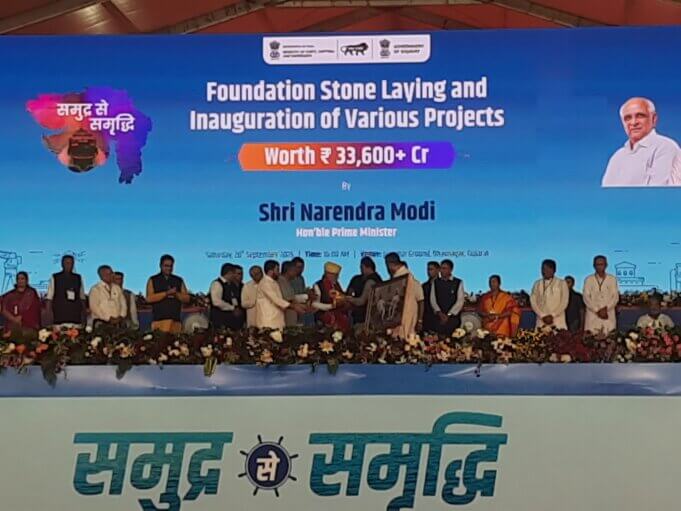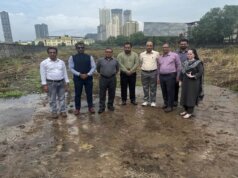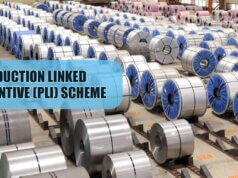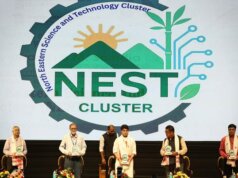Prime Minister Shri Narendra Modi inaugurated & laid the foundation stone of development works worth over Rs 34,200 crore in Bhavnagar, Gujarat. Addressing the ‘Samudra se Samriddhi’ event, the Prime Minister welcomed all the dignitaries and the people. He emphasized that 21st-century India views the ocean as a major avenue of opportunity. He informed that projects worth thousands of crores have just been inaugurated and foundation stones laid to accelerate port-led development. He added that to promote cruise tourism, the International Cruise Terminal in Mumbai has also been inaugurated. The Prime Minister noted that development projects linked to Bhavnagar and Gujarat have also commenced and extended his heartfelt wishes to all citizens and the people of Gujarat.
Prime Minister, remarking that with this vision, India’s maritime sector is now moving towards next-generation reforms. He announced that from today, all major ports in the country will be freed from multiple documents and fragmented processes. The implementation of ‘One Nation, One Document’ and ‘One Nation, One Port’ Process will simplify trade and commerce. Underlining that India has been an expert in building large ships for centuries, the PM remarked that next-generation reforms will help revive this forgotten legacy. He highlighted that in the past decade, more than 40 ships and submarines have been inducted into the Navy, and barring one or two, all have been built in India. He noted that the massive INS Vikrant was also constructed domestically, including the high-quality steel used in its production.
Highlighting that a historic decision was taken yesterday to strengthen India’s maritime sector, Shri Modi announced a major policy reform under which large ships have now been accorded infrastructure status. He remarked that when a sector receives infrastructure recognition, it gains significant advantages. The PM highlighted that shipbuilding companies will now find it easier to secure loans from banks and will benefit from reduced interest rates. All benefits associated with infrastructure financing will now be extended to these shipbuilding enterprises. Shri Modi emphasized that this decision will reduce the financial burden on Indian shipping companies and help them compete more effectively in the global market.
Emphasising that to make India a major maritime power, the Government is working on three major schemes, the PM remarked that these initiatives will ease financial support for the shipbuilding sector, help shipyards adopt modern technology, and improve design and quality standards. He informed that over Rs 70,000 crore will be invested in these schemes in the coming years.
He emphasized that shipbuilding is not an ordinary industry; it is globally referred to as the “Mother of All Industries” because it drives the growth of multiple allied sectors. The Prime Minister highlighted that industries such as steel, machinery, electronics, textiles, paints, and IT systems are all supported by the shipping sector. He noted that this creates significant benefits for small and medium enterprises (MSMEs). Citing research, the Prime Minister stated that every rupee invested in shipbuilding generates nearly double the economic return. He added that every job created in a shipyard leads to six to seven new jobs in the supply chain, meaning 100 shipbuilding jobs can result in over 600 jobs in related sectors, underscoring the massive multiplier effect of the shipbuilding industry.
Noting that in the past eleven years, India has doubled its port capacity, Shri Modi highlighted that prior to 2014, the average ship turn-around time in India was two days, whereas today it has been reduced to less than one day. He informed that new and large ports are being constructed across the country. He remarked that recently, India’s first deep-water container trans-shipment port has commenced operations in Kerala. Additionally, the PM announced that the Vadhavan Port in Maharashtra is being developed at a cost exceeding Rs 75,000 crore, and it will rank among the top ten ports in the world.
Mentioning that India currently accounts for 10 percent of global maritime trade, Shri Modi emphasized the need to increase this share and declared that by 2047, India aims to triple its participation in global sea trade and will achieve it.
Underscoring that India possesses a rich maritime heritage, symbolized by its fishermen and ancient port cities, Shri Modi remarked that Bhavnagar and the Saurashtra region are prominent examples of this legacy. The Prime Minister emphasized the importance of preserving and showcasing this heritage for future generations and the world. He announced that a world-class maritime museum is being developed at Lothal, which, like the Statue of Unity, will become a new symbol of India’s identity.
“India’s coastlines will become gateways to national prosperity”, exclaimed the Prime Minister. He expressed happiness that Gujarat’s coastline is once again proving to be a boon for the region. He remarked that this entire area is now setting a new benchmark for port-led development in the country. Shri Modi highlighted that 40 percent of the cargo arriving via sea routes in India is handled by Gujarat’s ports and these ports will soon benefit from the Dedicated Freight Corridor, which will enable faster movement of goods to other parts of the country and further enhance port efficiency.
Shri Modi stated that a robust ship-breaking ecosystem is emerging in the region, with the Alang Ship Breaking Yard serving as a prime example. He remarked that this sector is generating significant employment opportunities for the youth.
Background
In a major boost to the maritime sector, Prime Minister inaugurated and laid the foundation stone for multiple development projects related to the maritime sector worth over Rs 34,200 crore. He inaugurated the Mumbai International Cruise Terminal at Indira Dock. He laid the foundation stone of a new container terminal and associated facilities at Syama Prasad Mookerjee Port, Kolkata; new container berth, cargo handling facilities, and associated developments at Paradip Port; the Tuna Tekra Multi-Cargo Terminal; firefighting facilities and modern road connectivity at Kamarajar Port, Ennore; coastal protection works including sea-walls and revetments at Chennai Port; sea-wall construction at Car Nicobar Island; a multi-purpose cargo berth and Green Bio-Methanol Plant at Deendayal Port, Kandla; and ship repair facilities at Patna and Varanasi.
In line with his commitment to holistic and sustainable development, Prime Minister inaugurated and laid the foundation stone of multiple projects of the central and state government, worth over Rs 26,354 crore, catering to various sectors in Gujarat. He inaugurated HPLNG Regasification Terminal at Chhara Port, Acrylics & Oxo Alcohol Project at Gujarat IOCL Refinery, the 600 MW Green Shoe Initiative, PM-KUSUM 475 MW Component C solar feeder for farmers, the 45 MW Badeli Solar PV Project, complete solarization of Dhordo village among others. He laid the foundation stone of LNG infrastructure, additional renewable energy projects, coastal protection works, highways, and healthcare and urban transport projects, including expansions at Sir T. General Hospital in Bhavnagar, Guru Govind Sinh Government Hospital at Jamnagar, and the four-laning of 70 km of national highways.
Prime Minister will also undertake an aerial survey of the Dholera Special Investment Region (DSIR), envisioned as a greenfield industrial city built around sustainable industrialization, smart infrastructure, and global investment. He will also visit and review the progress of National Maritime Heritage Complex (NHMC), at Lothal, being developed at a cost of around Rs 4,500 crore, to celebrate and preserve India’s ancient maritime traditions and serve as a centre for tourism, research, education and skill development.











